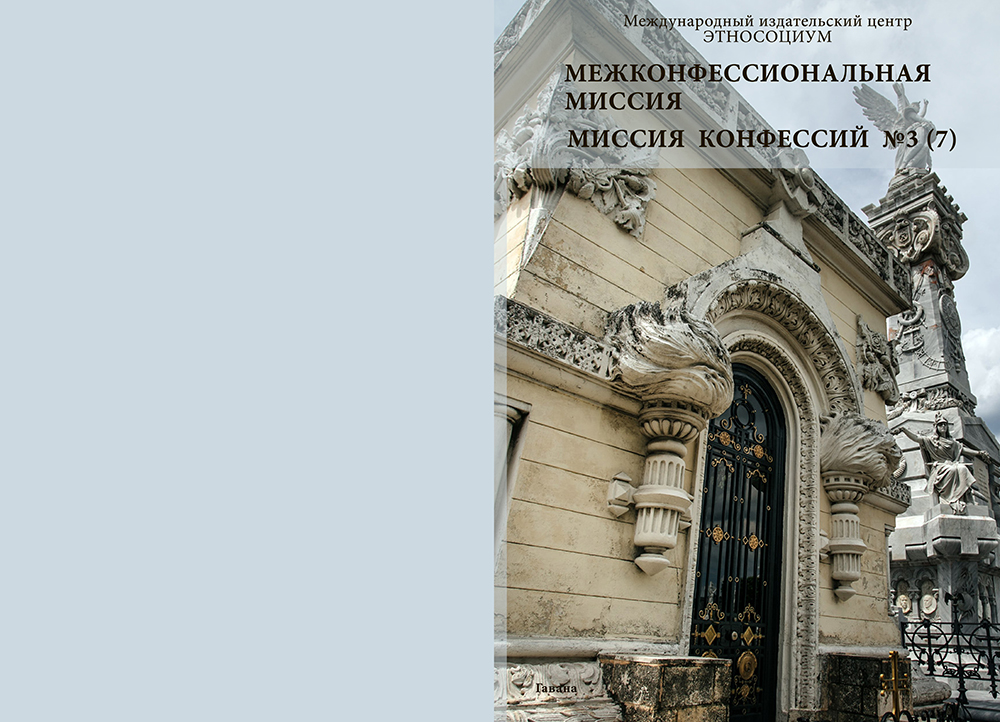Content
|
Ethnic groups and religion
|
|
|
Veselov V.I. The Rusyn movement in the Carpathian region of Ukraine in the late 1990s - early 2000s: in search of a way out of the crisis
|
4
|
|
Firsova V.S. Religion and identity of South Asian migrants in Japan
|
14
|
|
Sociology of Religion
|
|
|
Devyatkina G.N. Religious orientation of cultural preferences of the youth of the modern city (with the city of Togliatti as an example)
|
21
|
|
History of Religion
|
|
|
Kutikin V.U. Historiography of elders in the context of the development of Russian social thought in 30-70th of the XIX century
|
28
|
|
The ecumenical movement
|
|
|
Galaganova S.G. Anticulture as the main challenge to traditional values and ecumenical movement
|
49
|
|
Dannenberg A.N. Modern Catholic ecumenism
|
56
|
|
Reviews
|
|
|
Ryabova E.L. Review of the work of the Kiev Theological Academy Deacon Sergius Bogachenko "Instrumental music in worship of the Christian Church of East and West"
|
61
|
|
Abstracts
|
65
|
|
Authors
|
68
|
Abstracts
Veselov V.I.
The Rusyn movement in the Carpathian region of Ukraine in the late 1990s - early 2000s: in search of a way out of the crisis
The article is devoted to the functioning of Rusyn organizations of Transcarpathian region in 1998-2001. During that period, the last attempt to restore the authority of Society of Carpatian Rusyns failed, and Rusyn movement began to search for new formats of organization. Also, it was the time of preparation for the Ukrainian census of 2001 that was to show national structure of the population of Transcarpathia region.
Keywords: Rusyns, Transcarpathian region, Ukraine, ethnicity, history of the Ukraine.
Firsova V.S.
Religion and identity of South Asian migrants in Japan
The present article describes religion as a core aspect of identity formation of migrants from South Asia in Japan. Religious practices accepted in migrants’ families support the transferring of not only religion but also Indian (South Asian) identity among generations, brought up in the diaspora.
Keywords: Indians in Japan, Indian diaspora, religion, identity.
Devyatkina G.N.
Religious orientation of cultural preferences of the youth of the modern city (with the city of Togliatti as an example)
The article examines the historical progress of Russian singing culture formation, understanding of which is necessary for rethinking and development of modern choral art. To understand the developments in the singing culture in Russia it is necessary to analyze the stages of its emergence and development, primarily in the field of Church music, which is the source of its inception.
Keywords: young city, the cultural preferences of young people, spirituality and morality, the content and form of cultural development of urban youth.
Kutikin V.U.
Historiography of elders in the context of the development of Russian social thought in 30-70th of the XIX century
The article discusses historiography of two independent events in the history of Russia of the XIX century, their mutual influence on each other: Russian social thought and monastic starets of Optina Pustyn (Monastery). The Church and Russian thinkers used the system of spiritual education in Orthodoxy. The author of the article describes how starets influenced the views and creativity of Russian thinkers. The article shows how at certain periods of development of historical science the interaction of these phenomena is reflected in the studies of researchers.
Keywords: historiography, Russian social thought, conservatism, Slavophile, Byzantinism, spiritual guidance monkhood, Optina Pustyn, starets (a religious adviser (not necessarily a priest) in the Eastern Orthodox Church.
Galaganova S.G.
Anticulture as the main challenge to traditional values and ecumenical movement
Anticulture, inevitably produced by global capitalism, is argued to be the main threat to Creation and Faith, as well as the main challenge to ecumenical movement.
Keywords: Ecumenicism, ecumenical movement, traditional values, culture, anticulture, capitalism, Money Civilization, consumerism.
Dannenberg A.N.
Modern Catholic ecumenism
In the article the modern views of the Catholic Church on the issue of ecumenism are given. Despite the fact that since the 1960th the Catholic Church has actively been involved in the ecumenical process of recognizing the presence of elements of truth in other Christian denominations, as well as in non-Christian religious traditions, it continues to consider ecumenism as an inclusion of non-Catholics in the sphere of influence of Catholicism.
Authors
Dannenberg A.N., Doctoral, Candidate of Historical Sciences, Associate Professor of the Department of State and Confessional Relations of The Russian Presidential Academy of National Economy and Public Administration.
Devyatkina G.N., Head of the department "Chorus of Boys" of the Municipal budgetary educational institution of additional education for children, children's music school № 4, Togliatti.
Firsova V.S., Competitor of the South and South-West Asia department of the Peter’s Great Museum of Anthropology and Ethnography.
Galaganova S.G., Bauman Moscow State Technical University, Department of Information Analysis and Political Technologies, Candidate of Philosophical Sciences, Associate Professor.
Kutikin V.U., Post-graduate student of the Department of the History of Russian Statehood, Faculty of History Institute of Social Sciences of The Russian Presidential Academy of National Economy and Public Administration.
Ryabova E.L., Doctor of political sciences, Professor, Chief Editor of “Etnosotsium” international publishing house.
Veselov V.I., Post-graduate student of the Department of History of CIS countries of the Faculty of History (Lomonosov Moscow State University).





